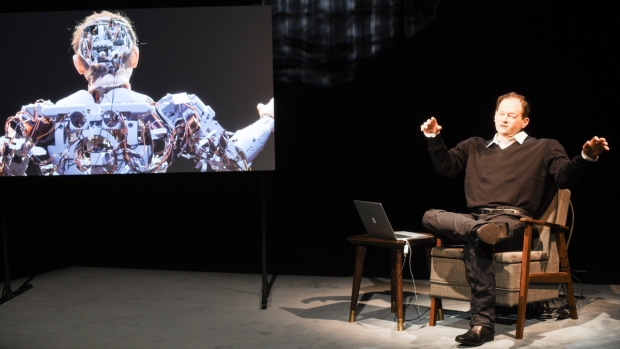Uncanny Valley at Battersea Arts Centre – review

© Gabriela Neeb
Robots are taking over. Not a joke, just a fact. Well, at least in the sense that machines have already begun to replace many physical jobs such as, in the case of the new Amazon grocery stores, supermarket workers. But what about actors? Can a show succeed in the same way if its only speaker on stage is a robot? German theatre group Rimini Protokoll explores this question in Uncanny Valley, staged at Battersea Arts Centre in a series of sold-out performances before heading out on tour.
Author and playwright Thomas Melle has, over the years, become tired of author meet-and-greets and talks, so has now replaced himself with a robot doppelganger to deliver his lectures instead. Melle's voice is still pre-recorded, which the robot lip-syncs to while sat in a chair, one leg crossed over the other (which, if imitating a human, is surely an uncomfortable pose to hold for over an hour?). In the lecture, we are shown how the robot was made, with Melle having to sit in a chair for hours while a mould was made of his face. Melle calls the process like wearing a "Silicone Death Mask". The outcome is extraordinary – the robot does look exactly like Melle (who we see on a screen in a series of interviews) and eerily human. Apart from, of course, the fact that the back of his head is wide open with a whole bunch of wires connected to it and it can rotate its ankle a full 360 degrees.
But what of the content itself? Director Stefan Kaegi's production has Robot-Melle deliver a lecture which thoughtfully considers what it means to be human, citing the Turing Test (enquiring whether participants can guess if AI is a machine or can pass as a human in conversation) as well as showing interviews with people whose lives have been helped by machinery such as someone who can hear for the first time thanks to an aid, as well as prosthetic limbs. The conversation also veers into talking about emotional manipulation in theatre with the demonstration of a ‘theatre machine' (a light) being able to manipulate how you feel by it's pre-programmed disco lighting, as well as different types of music (composed by Nicolas Neecke), though from the audience reaction it is not clear this has any effect at all on its own.
It's certainly a cool concept, but after the initial excitement and intrigue of seeing this robot on stage, there isn't really anywhere else to go with it. The content of the lecture is intriguing, but coupled with a dark and warm space, isn't stimulating enough for the full hour. Additionally, the delivery is, somewhat naturally, robotic, and because it is the same programmed performance each night we miss what we love about theatre: the liveness and, more importantly, reactivity of it. Jokes feel stunted, and even the added filler words feel like an alien mimicking of speech. As Robot-Melle says, it is not he who is the random thing that evening, but the daily-changing audience.










